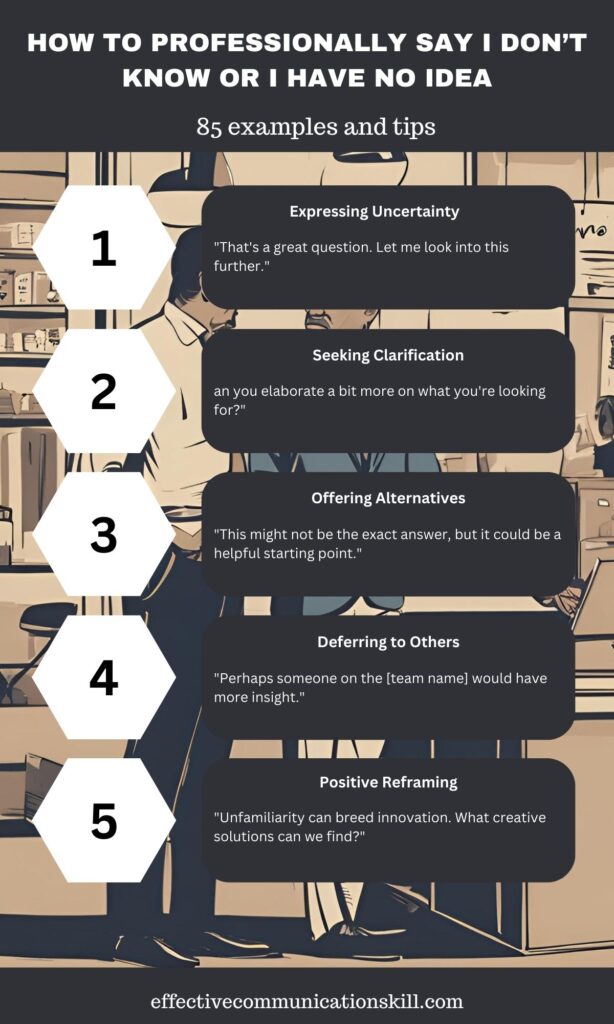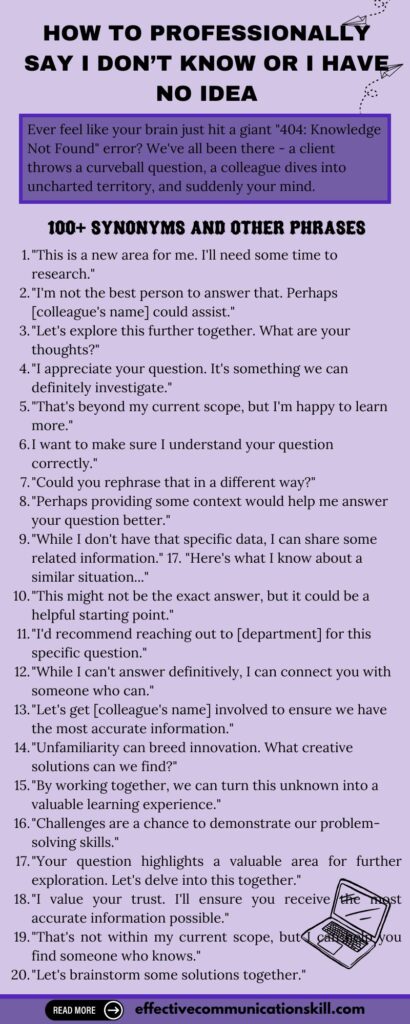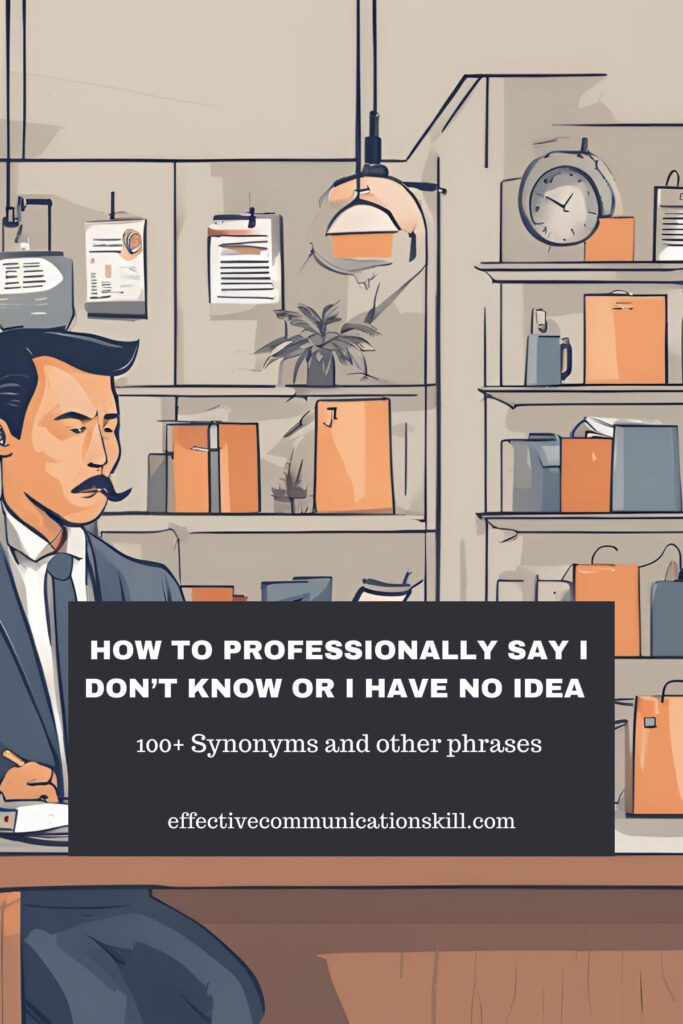How to say I don’t know in a professional way
Ever feel like your brain just hit a giant “404: Knowledge Not Found” error? We’ve all been there – a client throws a curveball question, a colleague dives into uncharted territory, and suddenly your mind transforms into a tumbleweed-strewn desert landscape.
Fear not, knowledge nomads!
This guide isn’t a dusty textbook, it’s a survival manual for navigating the unknown. How to Say No Problem Professionally – We’ll equip you with the tools to transform “I don’t know” into “Let’s explore this exciting mystery together!” and emerge a professional oasis of helpfulness.

How to say I don’t know in a professional way?
Here are key strategies and tips to say I don’t know or I have no idea in a professional way for different situations:
- Acknowledge and Reassure: Begin by directly acknowledging the lack of information. Follow it with reassurance, letting them know you’ll find the answer. *Example: “That’s a great question. I don’t have that information readily available, but I’m happy to research and get back to you by the end of the day.”
- Clarify and Refocus: If unsure about the question itself, politely ask for clarification. This ensures you’re addressing the right issue. *Example: “I want to ensure I fully understand your question. Are you asking about X or Y?”
- Offer Alternatives: Sometimes, you might have relevant knowledge in a different area. Offer this as a potential starting point. *Example: “While I’m unfamiliar with specific details, I can share some general industry trends that might be helpful.”
- Direct to Expertise: Know your team’s strengths. If someone else is better suited, offer to connect them. *Example: “This is an excellent question for [colleague’s name]. They have deep expertise in this area and would be happy to assist.”
- Take Ownership and Follow Up: Always take ownership of finding the answer. Set a clear timeframe for when you’ll get back with an update. *Example: “I’ll research this thoroughly and provide a comprehensive response by tomorrow morning.”
100+ Formal and Professional ways to say I don’t know or I Have No Idea
The following is a list of Synonyms and other ways to say I don’t know in a professional, polite and formal way:
Expressing Uncertainty
- “That’s a great question. Let me look into this further.”
- “I’m not entirely sure, but I can find out.”
- “I’d need more information to give you a definitive answer.”
- “It’s an interesting point. I’ll have to check on that.”
- “To be honest, I’m not familiar with that specific detail.”
- “This is a new area for me. I’ll need some time to research.”
- “I’m not the best person to answer that. Perhaps [colleague’s name] could assist.”
- “Let’s explore this further together. What are your thoughts?”
- “I appreciate your question. It’s something we can definitely investigate.”
- “That’s beyond my current scope, but I’m happy to learn more.”
Seeking Clarification
- “Can you elaborate a bit more on what you’re looking for?”
- “Just to be sure, are you interested in X or Y?”
- “I want to make sure I understand your question correctly.”
- “Could you rephrase that in a different way?”
- “Perhaps providing some context would help me answer your question better.”
Offering Alternatives
- “While I don’t have that specific data, I can share some related information.” 17. “Here’s what I know about a similar situation…”
- “This might not be the exact answer, but it could be a helpful starting point.”
- “Let me see if I can find some resources that might be relevant.”
- “I can’t answer definitively, but I can offer some general insights.”
Deferring to Others
- “This falls outside my area of expertise, but [colleague’s name] would be a great resource.”
- “Perhaps someone on the [team name] would have more insight.”
- “I’d recommend reaching out to [department] for this specific question.”
- “While I can’t answer definitively, I can connect you with someone who can.”
- “Let’s get [colleague’s name] involved to ensure we have the most accurate information.”
Taking Ownership and Following Up
- “I’ll research this and provide a clear answer by [timeframe].”
- “I’ll get back to you with a comprehensive response as soon as I have it.”
- “Let’s schedule a follow-up meeting to discuss this further.”
- “I’ll do some digging and keep you updated on my findings.”
- “I appreciate your patience. I’ll prioritize finding this information for you.”
Expressing Willingness to Learn
- “I’m always eager to learn more. Can you share some resources?”
- “This is a great opportunity for me to expand my knowledge in this area.”
- “I’d be happy to research this alongside you and learn from your expertise.”
- “Thank you for bringing this up. It’s a valuable learning experience for me.”
- “Let’s tackle this challenge together. I’m confident we can find the answer.”
Positive Reframing
- “This is an interesting question that opens up new possibilities.”
- “Let’s view this as an opportunity to explore a new topic.”
- “Unfamiliarity can breed innovation. What creative solutions can we find?”
- “By working together, we can turn this unknown into a valuable learning experience.”
- “Challenges are a chance to demonstrate our problem-solving skills.”
Transparency and Appreciation
- “I want to be upfront – I’m not familiar with this, but I’m committed to finding out.”
- “It’s important to be honest. I don’t have the answer right now, but I’ll get it for you.”
- “Thank you for your understanding. I appreciate your patience while I research this.”
- “Your question highlights a valuable area for further exploration. Let’s delve into this together.”
- “I value your trust. I’ll ensure you receive the most accurate information possible.”
Direct and Concise Options
- “I’ll need to investigate that further.”
- “Let me get back to you on that.”
- “I’m not sure, but I can find out.”
- “I can’t answer that definitively at this time.”
- “That’s not within my current scope, but I can help you find someone who knows.”

Offering Solutions
- “Here are some resources that might be helpful in the meantime.”
- “Perhaps we can discuss alternative approaches.”
- “Let’s brainstorm some solutions together.”
- “I can offer some general insights, but further research is needed.”
- “While I don’t have the answer, I can connect you with someone who can help troubleshoot.”
Confidence and Reassurance
- “Don’t worry, I’ll find the answer and get back to you soon.”
- “We can definitely figure this out together.”
- “I’m confident we can find a solution that works for everyone.”
- “I appreciate your patience. I’m committed to getting you the information you need.”
- “Challenges are a chance for us to showcase our collaborative problem-solving skills.”
Maintaining Professionalism
- “Thank you for your question. I’ll be sure to follow up with a clear answer.”
- “I apologize for any inconvenience. I’ll do my best to find the information quickly.”
- “Let’s table this discussion for now and revisit it when I have more details.”
- “I appreciate your understanding. It’s important to be thorough in our research.”
- “While I can’t provide an answer right now, I’m happy to discuss next steps.”
Empathy and Understanding
- “I understand this may be frustrating. Let’s work together to find a solution.”
- “It’s perfectly normal not to know everything. The important thing is to find the answer.”
- “I appreciate your patience as we navigate this unknown territory.”
- “Let’s focus on what we can control and explore solutions collaboratively.”
- “Thank you for your trust. I’m here to support you in finding the information you need.”
Positive and Proactive Language
- “This is a great opportunity to learn more about [topic].”
- “Let’s tackle this challenge head-on. I’m confident we can find a solution.”
- “I’m eager to get to the bottom of this for you.”
- “Unfamiliarity can be a springboard for innovation. What creative approaches can we take?”
- “Thank you for bringing this up. It allows us to explore new possibilities.”
Expressing Interest and Initiative
- “I’m curious to learn more about this. Can you share some details?”
- “Let me take the initiative to research this and report back.”
- “I’m happy to put in the extra effort to find the answer you need.”
- “This is a valuable learning experience for both of us. Let’s explore it together.”
- “I’m committed to providing you with the most accurate information possible.”
Transparency and Open Communication
- “To be honest, I’m unfamiliar with this, but I’m a quick learner.”
- “It’s important to be transparent. I don’t have the answer yet, but I’ll find it.”
- “Thank you for your patience. I’ll keep you updated on my progress in finding the answer.”
- “Let’s have an open discussion about this. What are your thoughts and concerns?”
- “I value your trust. I’ll ensure you’re informed throughout the process.”
Focus on Solutions and Outcomes
- “While I can’t answer definitively, let’s discuss some potential solutions.”
- “The answer may not be readily available, but let’s brainstorm some next steps.”
- “I may not have the specific knowledge, but I can offer some general troubleshooting tips.”
- “Finding the answer might take some time, but I’ll prioritize it for you.”
- “Let’s work together to achieve the best possible outcome in this situation.”
Maintaining Credibility
- “It’s important for me to provide accurate information. Let me double-check this first.”
- “I don’t want to give you misleading information. I’ll conduct a thorough investigation.”
- “While I’m unfamiliar with this detail, I can assure you of my commitment to excellence.”
- “Thank you for your trust. I’ll leverage my expertise in related areas to find the answer.”
- “Let’s ensure we have the most up-to-date information before proceeding.”
Collaboration and Teamwork
- “Perhaps by combining our knowledge, we can find the answer together.”
- “Let’s leverage the team’s expertise to tackle this challenge.”
- “I’m happy to collaborate with you in researching this further.”
- “We can achieve more by working as a team. Let’s brainstorm some ideas.”
- “Thank you for bringing this to my attention. Together, we can find a solution.”
- “This is a complex question. What are your thoughts on how we can approach it together?”
- “I might not have the technical expertise, but perhaps someone on the team does. Let’s see if we can find a solution collectively.”
- “While I’m unfamiliar with this specific area, I can offer my perspective from [your area of expertise]. How can we combine our knowledge to move forward?”
- “This seems like a perfect opportunity for a brainstorming session. Let’s get everyone’s ideas on the table.”
Additional Options
Here are some additional options to consider, depending on the situation:
- Humor (use with caution): “That’s a tough one! Maybe we should consult the magic eight ball?” (Only appropriate in a lighthearted environment)
- Direct Approach: “I’m not familiar with that, but I’m a quick learner. Can you give me a brief overview?”
- Phrases for Deadlines: “To ensure the most accurate answer, I’ll need some time to research this. Can we circle back by [timeframe]?”
- Following Up: “I haven’t forgotten about your question! I’m still digging into it and will update you as soon as I have something concrete.”
Remember:
- Confidence is key: Even if you don’t have the answer, project confidence in your ability to find it.
- Body language matters: Maintain good posture and eye contact to convey sincerity.
- Focus on solutions: Shift the conversation towards finding a solution, even if it involves further research or collaboration.

Conclusion
The inability to answer a question definitely doesn’t have to be a setback. By wielding honesty and a collaborative spirit, you can turn these situations into opportunities to learn, build trust, and showcase your problem-solving skills.
This guide has equipped you with over 100 ways to professionally express that you don’t have all the answers, while demonstrating your commitment to finding solutions. Remember, effective communication is key. So next time you’re caught off guard by a question, use these strategies to navigate the unknown with grace and professionalism.
